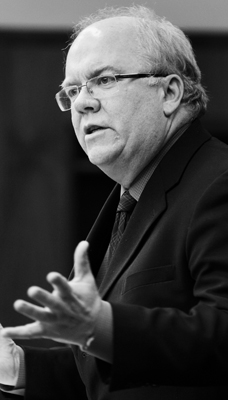At Issue: Reforming education, saving money
By Kris Berggren
 Ideas for reforming K-12 education with the best chance of bipartisan support, given the enormous and growing deficit, are pragmatic, such as improving cost efficiencies through sharing services and collective purchasing among districts and mandate reductions.
Ideas for reforming K-12 education with the best chance of bipartisan support, given the enormous and growing deficit, are pragmatic, such as improving cost efficiencies through sharing services and collective purchasing among districts and mandate reductions.
“We are simply not going to have as much money as we want to spend,” said Rep. Pat Garofalo (R-Farmington), Republican lead on the House K-12 Education Finance Division. “Whether we raise taxes or not, we are simply not going to be able to spend more money. That is not a position; that is just math.”
On the other hand, Rep. Mindy Greiling (DFL-Roseville), the division chairwoman, believes there will ultimately be a tax increase this session, which will help fund the three top education priorities of the House, Senate and governor. They are, respectively:
 • a start to implementing HF2, commonly referred to as the New Minnesota Miracle;
• a start to implementing HF2, commonly referred to as the New Minnesota Miracle;
• appropriations for special education funding; and
• expanding Q-Comp, the teacher incentive fund linked to student progress.
“I think in the end this will get so ugly there will be three Republicans who join the Democrats” to approve a tax increase, Greiling said.
A number of reform ideas were offered to the division at its Jan. 20 hearing, and to the House K-12 Education Policy and Oversight Committee the following day. No action was taken.
For now, both Garofalo and Greiling favor reducing burdensome mandates and sharing services. Greiling said the division will form groups to sift through dozens of suggestions gleaned from hearings, recommendations from a June 2008 legislative auditor’s report and constituent input.
“Many will be stabbed with many daggers before they see the light of day,” Greiling said, but some will make it into legislation.
Sharing services saves money
One idea proferred by education advocates was lowering costs through bulk purchasing of everything from pencils to payroll services.
In addition to creating a lending library of math and science materials, Grace Kelliher, director of governmental relations for the Minnesota School Boards Association, suggested a traveling team of specialists as a means of sharing resources and expertise, an idea she said is working in Alabama.
Earl Athman, business manager for the Minnesota Association of School Business Officials, suggested collectively purchasing utilities rather than paper or other materials that require storage.
Rep. Carol McFarlane (R-White Bear Lake) noted many districts now share services and talent to mixed reviews. “My intermediate district asked if they could testify it is an effective way to save and do things,” she said.
Mandate reductions widely sought
An eight-page laundry list of legislative mandates compiled by education advocates highlights the sheer volume of rules governing daily district business which can erode tight budgets and sometimes instructional time.
While no single mandate is unreasonable, Charlie Kyte, executive director of the Minnesota Association of School Administrators, said, “In total it’s smothering the school districts.”
Themes emerged throughout the hearings.
For example, the desire to reduce mandates limiting local control over the school calendar. Advocates said that could open the door to a four-day week — which has saved some districts transportation costs — to summer school or other extended-day options to enhance learning and retention or to adjust start times to “when it’s best for kids,” as Kelliher put it.
The business officials association would eliminate state support for nonpublic textbooks, school nurse services and counseling. The school board association suggests discontinuing transporting charter and non-public school students on the state’s dime or charge parents a fee for transportation services.
Other reform ideas on the table
There is also at least some bipartisan support for a third reform — charter schools.
They’re considered by some an entrepreneurial way to test new ideas in education or create learning environments that work well for certain groups of students, though some traditionalists perceive them as an end run around the system that drains money from districts.
“We have to be open to anything that helps children,” said Rep. Jim Abeler (R-Anoka). He admits charters must sharpen their fiscal accountability including their leasing arrangements, sponsorship relations and oversight practices. He promised “some action this session” on improving charters’ fiscal accountability.
Early learning also made the list of reform ideas.
Seen as the backbone of future learning, principals and school administrators want to see their future students get a head start. Roger Aronson, legislative counsel for the Minnesota Elementary School Principals’ Association, called all-day kindergarten and early childhood education “reforms sitting on the shelf waiting to happen.”
Accountability remains a thorny issue in the reform discussion.
While testing has established a baseline from which to build, and more rigorous standards have set the bar higher, some accountability measures deeply trouble those charged with administering them, such as the Education Department’s Graduation Requirement Assessment for Diploma.
Student progress is a condition of the governor’s proposal to boost Q-Comp funding and other financial incentives to districts, but legislators and educators have differing views on how best to measure gains.
Session Weekly More...
Related Stories
The year without a K-12 law
School funding is flat, no reforms enacted
(view full story)
Published 6/1/2010
House K-12 omnibus bill fast-tracked
Senate slow to respond with companion legislation
(view full story)
Published 5/13/2010
K-12 education omnibus bill stalls
Teacher licensure proposals in contention
(view full story)
Published 5/6/2010
K-12 education bill moves forward
Measures would activate reforms, stabilize school funding
(view full story)
Published 4/29/2010
Resuscitating Race to the Top bid
New bid could hinge on proposals to boost teacher effectiveness
(view full story)
Published 4/22/2010
Raiders of the lost fund
Slew of reforms could boost Permanent School Fund income
(view full story)
Published 3/25/2010
Schools shore up state’s checkbook
Obscure law forces drawdown of school reserves before state can borrow
(view full story)
Published 2/25/2010
At Issue: No shifts, no cuts
Education funding in a holding pattern
(view full story)
Published 5/29/2009
At Issue: E-12 education bill that might have been
Funding held steady with no shifts proposed, but no Minnesota Miracle
(view full story)
Published 5/15/2009
At Issue: Investing in quality care for kids
Lawmakers hope for long-term benefits of early investment
(view full story)
Published 4/24/2009
At Issue: Building a better formula
Omnibus K-12 education finance bill floor debate highlights obstacles
(view full story)
Published 4/24/2009
At Issue: Whose values are they anyway?
Lawmaker carries on family legacy with sex education bill
(view full story)
Published 4/17/2009
First Reading: One school doesn’t fit all
Efforts put forward to tailor charter school law
(view full story)
Published 4/10/2009
At Issue: Hopeful education goals in a dismal year
Omnibus bill addresses changing needs and future demands
(view full story)
Published 4/3/2009
At Issue: Getting kids to move
Bill aims to ensure ‘No child left on their behind’
(view full story)
Published 2/20/2009
First Reading: Accountability funding for all
A ‘New Minnesota Miracle’ requires a leap of faith
(view full story)
Published 2/13/2009
At Issue: Q Comp found wanting
Performance measure has perks, but is it affordable?
(view full story)
Published 2/6/2009
At Issue: Reforming education, saving money
Bipartisan support shown for mandate reduction and shared services
(view full story)
Published 1/23/2009
Feature: Passing the torch of democracy
Youth immerse themselves in lingo and actions of lawmaking
(view full story)
Published 1/16/2009